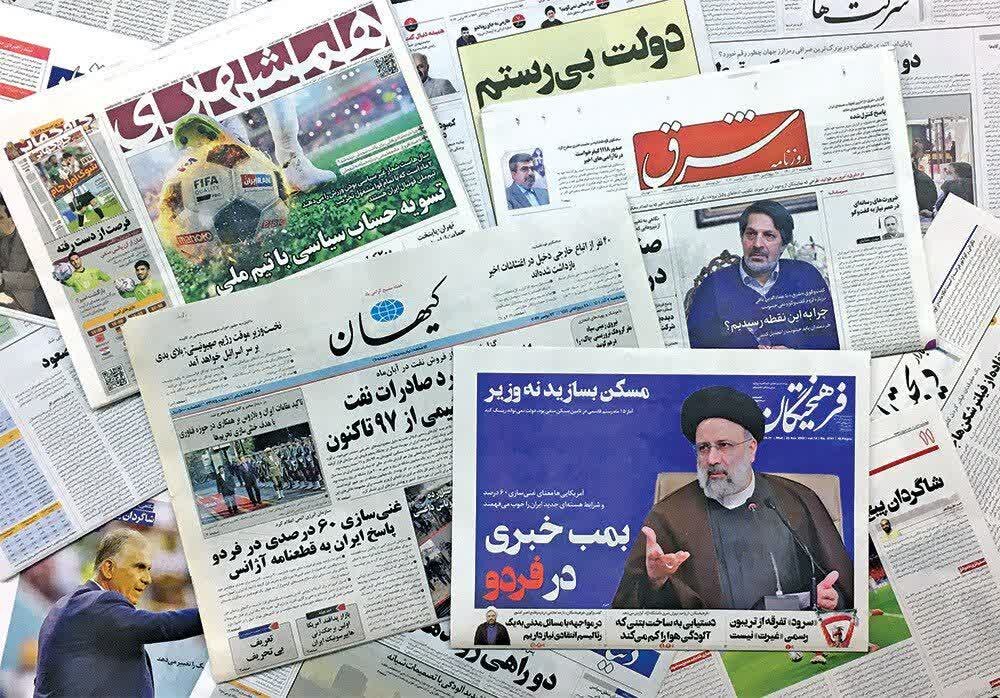Officials to blame for recent problems

TEHRAN-- If the government really intends to create changes, the people’s demands must be heard and steps taken to satisfy the disappointed citizens, Seyyed Hossein Mousavi Tabrizi, a religious scholar, told Arman-e Melli.
“These problems, such as corruption, inexpert management and policies, high prices and inflation did not occur in an hour or a day, but through years,” the cleric noted.
These problems have caused a significant segment of society to face troubles and now they are looking to warns authorities of these difficulties through protests, the former judge commented.
“Shifting the blame to sanctions and foreigners will not solve the problems because people say that the governments are the ones who get votes from us to present solutions. I believe that the officials should think of a solution as soon as possible and improve the conditions so that people do not face more challenges,” he suggested.
Germany’s game with Karimi and Islamic Republic
The meeting of Ali Karimi, a former football player, with German President Frank-Walter Steinmeier was the main headline and photo of the conservative Javan newspaper in which it analyzed Germany’s support for individuals seeking to overthrow the Islamic Republic but maintaining relations with the country.
The columnist said Karimi was never involved in political activities and now the materials posted on his social media network are written by politically-minded persons.
During the events in Iran over the last three months, the Germans left no stone unturned for backing those seeking to overthrow the Islamic Republic system. Its support has ranged from putting pressure on the Iranian government and sponsoring the convicts charged with security-related offences to drafting anti-Iran resolutions and hosting anti-Iran rallies.
However, Europe is currently worried about instability in the region, especially after the wave of migration that followed the crisis in Syria. And in fact, Europe is worried that Iranians will flood Europe in case of a Syrianization of Iran, the publication concluded.
------------ Iran: White House back to diplomacy
Quoting U.S. Special Envoy for Iran Robert Malley who said “my job is to promote and protect the interests of the United States” and refusing the notion that the JCPOA dead, the pro-government Iran newspaper, in a commentary, said that the White House is embracing diplomacy after the chaos project in Iran failed.
Blinken and Borrell’ positions show that America and Europe are seeking to restart the nuclear negotiations in order to delay Iran’s nuclear progress. However, by raising two new issues – namely the riots and Tehran’s military cooperation with Moscow - they are trying to invent excuses to strengthen sanctions on Iran.
Officials in Tehran have warned that the West will not be able to achieve its ambitious goals through propaganda campaigns and greater pressure on the Islamic Republic. Iran also reminded them that the JCPOA will not be revived unless they agree to Iran's demands and stop threats and blackmails.
Etemad: Iran's foreign policy needs revision
The reformist Etemad publication interviewed Nader Entesar, a professor at the University of South Alabama, who believes that Iran’s foreign policy should be reviewed and restructured.
Entesar said issues surrounding the JCPOA, the intensification of tensions with the West over the issue of military cooperation with Russia, and significant pressure on Iran on human rights issues have put Tehran in a difficult situation in terms of foreign policy.
“Russia has got somewhat closer to Iran due to the problems it is facing, and if these problems are solved one day, Russia’s view will change. China also made statements with Saudi Arabia against Iran, including about Iran’s territorial integrity, which showed that China is not a permanent partner,” he opined.
He added if America and Europe increase pressure on Iran, Russia and China will prevent a complete isolation of Iran, but the country will face a situation in which it no longer has other choices except relations with China and Russia.
Iran should seriously review its foreign policy based on “realism”, Entessar suggested, adding in foreign policy decision-making and action should be based on national interests rather than partisan interests.
Sharq: Inconspicuous role in international decision-making on women
The pro-reform newspaper of Sharq, in an interview with Shahindokht Molaverdi, the former vice president for women's affairs, analyzed the country’s expulsion from the Commission on the Status of Women and its consequences.
Molaverdi said membership of a country in these institutions can allow you to get involved in formulating and shaping regulations and leave the necessary influence. But, there is no immediate tangible effect on improving the conditions of women in that country.
It may also affect the future international relations, as well as the country’s presence and membership in other sub-commissions or even the main commissions of the United Nations, and this expulsion can actually be the beginning of bigger programs in a wider dimension which will lead to further isolation of the country as well as the intensification of political pressure and coercive measures and cutting off aid as well as cooperation for development, she explained.
